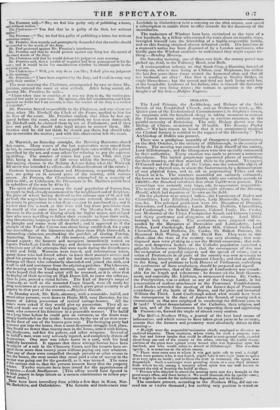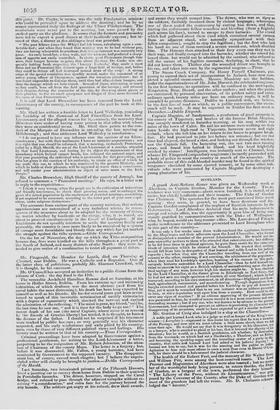IRELAND.
The Lord Primate, the Archbishop, and Bishops of the Irish branch of the Established Church, met on Wednesday week, a, Mr. Quin's (one of the Ecclesiastical Commissioners), in Stephen's Green, to cooperate with the beneficed clergy in taking measures to recover the Church incomes without resorting to extreme measures, or the painful necessity of distraining. The only Bishop absent was the Bishop of Cloyne, occasioned by ill health. The Evening Packet adds—" We have reason to know that it 1-fis unanimously resolved the Clerical Society is entitled to the support of the Hierarchy." The Archbishop of Dublin was present.
There was a prodigious assembly of Orangemen and Conservatives on the 30th October, in the vicinity of Hillsborough, in the county of Down. The meeting was convened by the High Sheriff of the county, Lord Hillsborough; and the Orangemen were also specially summoned by their authorities. Every exertion was made to procure a numerous attendance. The landed proprietors appointed places of assembling for their tenantry, and then marched them to the ground. To oppose O'Connell and the Repeal of the Union, was the ostensible object of the muster ; the real one, to alarm the Government, by a demonstration of vast physical force, and to aid in perpetuating Tithes and the Church as it is. The numbers assembled are variously estimated; the lowest we have noticed being 10,000, while one estimate ascends to 150,000—the Standard calculates that about 75,000 were present. The assemblage was certainly very large, nda its appearance respectable. The report of the proceedings occupies eight columns of the Morning Herald, which had reporters of its own on the field.
On the platform were several ladies—the Countesses of Roden and Clanwilliam, Lady Elizabeth Jocelyn, Lady Mandeville, Lady Bate- son, gne. The principal gentlemen were the Marquises of Donegal, Downshire, and Londonderry ; Lords Roden, Dufferin, Clanwilliatn, and Castlereagh ; Sir Robett Bateson, Colonel Forde, Dr. Cooke, late Moderator of the Ulster Presbyterian Synod, and between twenty and thirty gentlemen and clergymen of the county. Lord Hills- borough took the chair. The resolutions were proposed and se- conded by the Marquises of Dowttshire and Londonderry, Lord Roden, Lord Castlereagh, Lord Arthur Hill, Colonel Forde, Lord Clanwilliam, Lord Dufferin, Dr. Cooke, Sir Robert Bateson, the Reverend Holt Waring, and Mr. David Ker. They were to this effect—that the state of the country was very alarming ; that evil- disposed men were plotting to sever the British connexion; that sedi- tious arid dangerous leaders of the Catholic population exercised a palpable influence over Ministers ; that the consequence of this was the emigration of peaceful subjects and the spread of crime ; that a union of Protestants in all parts of the country was now necessary to maintain the integrity of the Protestant Church ; and that an address to the King, and petitions to both Houses of Parliament, embodying the sentiments of these resolutions, should be prepared and signed.
Of the speeches, that of the Marquis of Londonderry was remark- able for its length and vehemence : he denounced the Irish Govern- ment, and especially Mr. Littleton, in unmeasured terms. Dr. Cooke, the Presbyterian, was as ardent as any of the Orange Lords, in his asseveration of zealous attachment to the Protestant Establishment. Lord Roden reminded the meeting of the former days of Protestant ascendancy---of the battle of the Boyne, and the pious and immortal William the Third. Lord Castlereagh asked, what would have been the consequence in the days of James the Second, of issuing such a commission as that now employed in numbering the different sects in Irland ? Violent denunciations of the Catholics, their religion, and pelities, and of the Government for supporting them and oppressing th Protestants, formed the staple of almost every oration.
The Belfast Northern Whig, a journal of the best local means of information, and which seems to have taken great pains to be accurate, asserts that the farmers and peasantry were absolutely driven to this meeting- " Bailiffi were the respectableemissaries chiefly employed to threaten an enslaved tenantry. These creatures, whose visits, for such a purpose, were the last and lowest insults that could be offered to rent-ground serfs, crawled about from one end of the county to the other, uttering the karful denun- ciations of the great men against every tenant who was dependent upon his landlord, and who would refuse to attend at Ifillsborough. This was done openly : it is notorious to the whole county,. " There were some men to whom it was art quite safe to send a bailiff: There were persons who, it was feared, might take it into their heads to spurn at so very open an insult ; and to them the next in command, the agent, was despateheil. Such a messenger went prowling about, at a very short distance from where we sit, among a tenantry whose spirit was too well known to warrant the risk of hunting the bailiff at them. " Persons who objected to attend the meeting were sent for; brought to the great man's office, and there lectured. We could illustrate this by specific cases; but it might be unsafe for the unfortunate dependents, and we forbear."
The numbers present, according to the Nurthern Whig, did not ex- ceed ten or twelve thousand ; but nothing very positive is stated on this point. Dr. Cooke, it seeMs, was the only Presbyterian minister who could be prevailed upon to address the meeting ; end he by no means represented truly- the feelings of the Ulster Presbyteriens. The resolutions were never put to the meeting, but were passed by the peeked party on the platform.. It seems that the farmers and peasantry were led to expect a good dinner at their landlords' expense; but in- stead of that, a dinner at jive shillings a heed was provided.
" The poor fellows (says the Whig) had left home, calculating upon a com- fortable feed ; and when they found that notideg was to be had without pay, they not having wherewith to purchase, their d:s.,;ipointanent was naturally very great. An early breakfast, a long walk, and the Sena air, had produced a sharp- uess of appetite not easily controlled. In short, good Protestants though they were, their hunger became so great, that about the time Dr. Cooke was elo- quently holding forth respecting the ' huogry Lailicals' they made a most fierce and un-Protestant-like descent upon a large field of turnips, awl, before they could be driven off, had destroyed several acres of the crop! A strong corps of the special constables was speedily moved, under the command of an active young officer of Orangemen, against the voracious plunderers ; but it was found impossible to dislodge them, until they had allayed their hunger, and done the damage which up have stated. Several of them, after eating as much as they could, bore off from the field quantities of the turnips ; and evinced their eliagrin, during the remainder of the day, by throwing about pieces of their plunder, to the no small anuoyance and danger of those more devoted to the rause of true Protestantism."
It is said that Lord Downsbire has been removed from the Lord- Lieu tenancy of the county, in consequence of the part he took at this meeting.
Shell has written a forcible letter to Lord Wellesley, reminding Lis Lordship of the dismissal of Earl Fitzwilliain from his Lord- Limitenancy, avid the alleged reason for it,—namely, the necessity that Ministers were under of having some person in that office with whom they were on confidential terms. Mr. Sheil then points to the con- duct of the Marquis of Downshire in attending the late meeting at Hillsborough ; and thus addresses Lord Wellesley in conclusion-
" Ldo not pretend to have any influence over the opinions of my fellow- countrymen ; but with their sentiments I have an intimate acquaintance ; and it is right that you should be informed, that a meeting, exclusively Protestant, called by a High Sheriff, the son of the Lord-Lieutenant of a county, attended by that Lord Lieutenant, and having for its object the maintenance of that ascendancy which Ireland cannot brook, has inflamed the national anger, and that your permitting the individual who is answerable for this proceeding, and who has given it the sanction of his authority, to retain an office of which he has made this use, to which be was nominated by the present Ministry, and which he holds at their pleasure, will be regarded as worse than a connivance, and will render your administration an object of utter scorn to the Irish People."
Mr. Charles Brownlow, High Sheriff of the county of Armagh, has refused to summon a " Protestant meeting." lie says, in a letter sent in reply to the requisition-
" I think it very wrong, when the people are in the cultivation of industrious and friendly intercourse, to check their growing union, and to endanger the peace of a mixed population by the excitement of crowded meetings, assembling, afoot required to be convened, according to the latter part of your own rcqui- *Won, under religious distinctions."
The accounts from various parts of the country mention, that serious apprehensions are entertained of a very turbulent winter, in conse- quence of the measures about to be adopted for the recovery of tithes, mo matter whether by landlords or the clergy, who, it is stated, are about to proceed simultaneously in the Court of Exchequer. If the Legislature do not speedily interfere to settle the question finally and peaceably, the country is once more likely to be convulsed by a system of outrage more formidable and bloody than any which has yet marked the struggle against the tithe system.—Globe Correspondent.
On the hat of November, the day on which the Tithe-composition became due, fires were kindled on the bills throughout a great part of the South of Ireland, and many districts of-the North : they were in- tended to give notice of a combination to resist all payment of tithes.



















 Previous page
Previous page